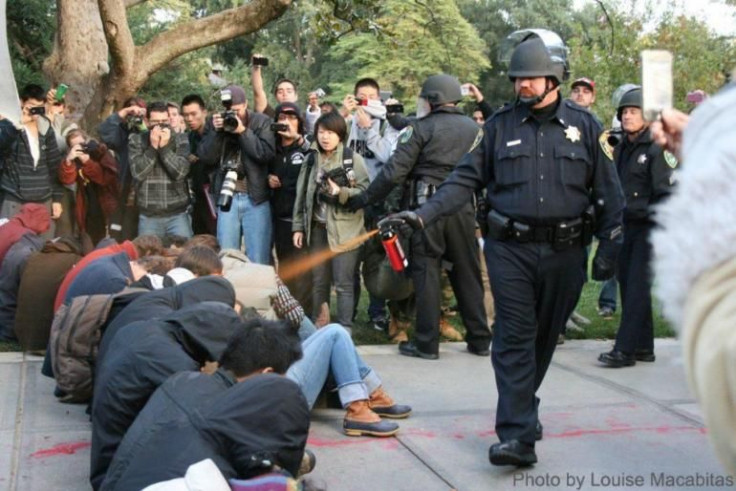'Pepper Spray Cop' Awarded $38,000 For Claimed Psychological Trauma After Macing Occupy Protesters [VIDEO]

John Pike, the cop who was videotaped shooting pepper spray in the eyes of protesters at an Occupy Wall Street event on the University of California, Davis campus back in 2011, has been awarded $38,000 due to the psychological trauma he allegedly suffered. Pike said death threats sent to him and his family caused him to suffer from anxiety and depression in the months following the event.
"This case has been resolved in accordance with state law and processes on workers' compensation," UC Davis representive Andy Fell said in a statement. "The final resolution is in line with permanent impairment as calculated by the state's disability evaluation unit."
The incident that occurred back on Nov. 18, 2011 resulted in Pike, a campus police Lt. at the time, being put on paid administrative leave. He was asked to leave the force eight months later in July 2012. A video depicting his actions showed Pike pepper-spraying students who had their arms locked and were sitting on the pavement.
Pike included “psychiatric injuries” in a worker’s compensation claim he filed back in June of this year; however, he did not identify how he was harmed by pepper-spraying the students. Pictures and videos of Pike with the pepper spray can and students covered in an orange substance became a symbol of the Occupy Wall St. movement.
Back in January, officials at the University agreed to a $1 million payout to resolve a settlement with students injured by the campus officer. Twenty-one protesters who were pepper-sprayed by Pike or arrested during the event received $30,000 each, the Davis Enterprise reports.
According to a psychiatric report released on Jan. 5 by California’s Department of Industrial Relations, Pike faced “continuing and significant internal and external stress with respect to resolving and solving the significant emotional upheavals that have occurred” in his life and failed to show evidence of substantial improvement.
The state Division of Workers Compensation Appeals Board agreed to a settlement of $38,055 on Oct. 16. The 40-year-old former Marine will also receive his retirement benefits for the 11 years he served as a university employee.



























